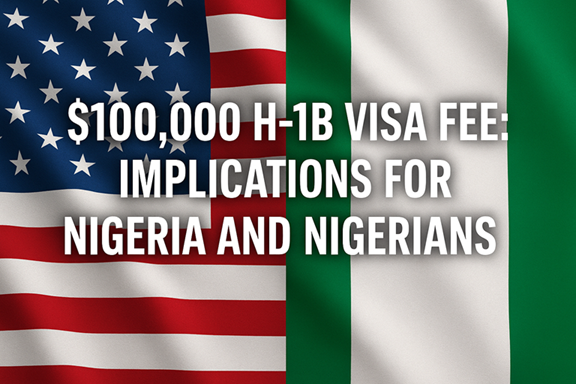President Donald Trump’s recent decision to impose a $100,000 fee on H-1B visa applications is more than a U.S. immigration tweak—it is a shockwave with deep consequences for countries like Nigeria.
For years, the H-1B has been the dream route for Nigerian professionals—especially in tech, medicine, and engineering—seeking greener pastures in America. With this astronomical fee, the dream is suddenly out of reach.

The Economic Blow
Nigeria relies heavily on diaspora remittances, which pour billions of dollars into the economy each year. Fewer migrants mean fewer remittances, hitting families, small businesses, and even the government’s foreign reserves.
The Forced Inward Look
But here’s the twist: with the U.S. door closing, professionals may begin to look inward. This could spark entrepreneurship, fuel the startup ecosystem, and push Nigerians to demand better governance at home. Corruption, poor infrastructure, and lack of jobs—the real triggers of migration—may now face sharper scrutiny.

Remote Work: A Silver Lining
For U.S. companies, paying $100,000 per worker is unsustainable. The alternative? Remote work. Talented Nigerians could now serve American firms from Lagos, Abuja, or Port Harcourt—earning globally while living locally. If Nigeria fixes its power and internet challenges, this could be a turning point.
The Big Picture
The $100,000 H-1B visa fee represents more than just an immigration hurdle; it is a structural shift with ripple effects across economies and societies. For Nigeria, the implications span reduced remittances, a possible slowdown in outward migration, and the urgent need to foster local opportunities. It could also stimulate remote work adoption and political awakening, as Nigerians recognize the necessity of holding leaders accountable for building a nation worth staying in.

In essence, while the move closes one door, it may open another—forcing both Nigerian professionals and their leaders to reimagine the future of work, governance, and national development.
This policy is a wake-up call. But it could also be the spark that drives Nigerians to build at home, demand accountability, and seize remote global opportunities.
The ball is in Nigeria’s court: will we rise to the challenge or lament the closed door?
Engr. Ugochukwu Egerue writes from Abuja




